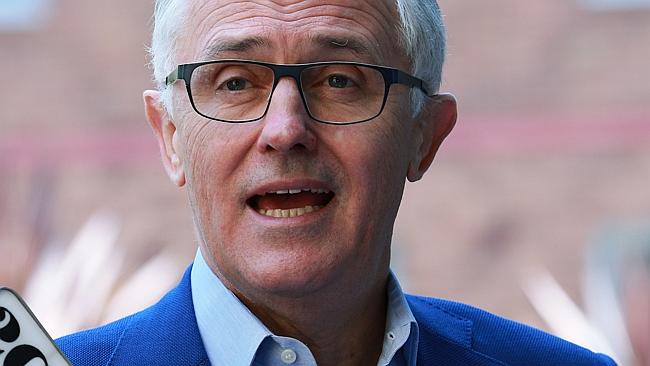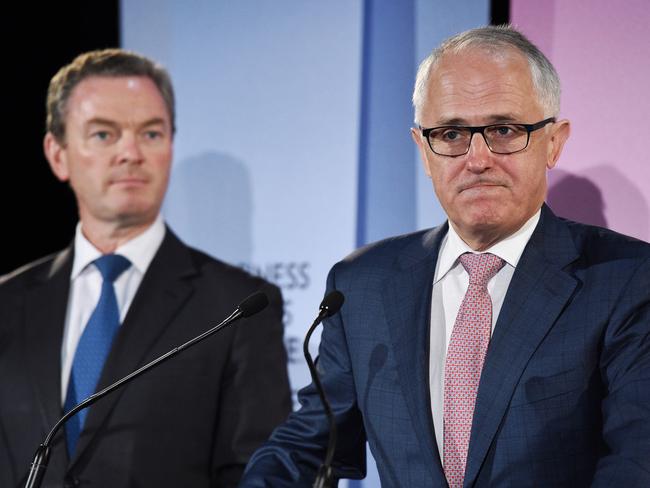Turnbull Government’s national innovation and science agenda to be released today
ORDINARY Aussies who put money into start-ups will get tax breaks, as Malcolm Turnbull tries to kickstart growth.

$1.1 billion reform package includes tax breaks for investors and new entrepreneur visa
$200 million CSIRO innovation fund and $250 million Biomedical Transition Fund will be created
Reforms have been welcomed by expert, as it will drive money towards startups and create jobs
- Summary of reforms
AUSSIES will be given incentives to invest in start-ups including including tax breaks and changes to crowdfunding laws as part of a $1.1 billion package of reforms, which has been welcomed by experts.
Prime Minister Malcolm Turnbull announced the National Innovation and Science Agenda with Innovation Minister Christopher Pyne today.
The agenda includes significant tax changes to help support start-ups and a new Entrepreneur Visa for those with financial backing to develop their ideas in Australia.
Mr Turnbull said Australians would benefit from a 20 per cent tax offset if they put their money into new businesses.
This means that if someone invested $20,000 in a start-up, they could claim an offset of $4000 on their tax bill.
If the money remains invested in the start-up for more than three years, the investor will be exempt from capital gains tax on any profit they made.
“This will drive substantial new investment,” Mr Turnbull said, adding that while there was no guarantee all the measures would work, those that didn’t would be replaced.

The government will create a Biomedical Transition Fund to co-invest $250 million with the private sector.
Health Minister Sussan Ley said $250 million which had originally been earmarked for the Medical Research Future Fund would be spent on turning health and medical research into a commercial reality.
“By investing in the early stages of commercialisation, we open the research pipeline from the laboratory bench to the patient’s bedside,’’ Ms Ley said.
“Researchers, clinicians, industry, governments and, especially, patients, will benefit from research ideas succeeding commercially.”
Fund managers will have to provide at least matching private sector funding for the projects to go ahead.
There will also be a $200 million CSIRO innovation fund to support co-investments in spin-off and start-up companies, products and services created by Australian research institutions.
Mr Pyne said the Agenda’s $36 million Global Innovation Strategy would support businesses and researchers to collaborate with their global counterparts on research.
Landing pads will be established for Australian entrepreneurs and start-ups in Tel Aviv, Silicon Valley and three other key locations.
There will be a $99 million investment in programs to boost digital literacy and skills in science, technology, engineering and mathematics (STEM) among young Australians.
“The Agenda will also commit, $13 million to increasing opportunities for women in research, STEM industries, start-ups and entrepreneurial firms,” Mr Pyne said.
A new Innovation and Science committee will be formed under Cabinet, with the newly formed Innovation and Science Australia acting as an independent advisory board.
“The release of the Agenda is just the beginning. The next step will be a national discussion around this new way of thinking and doing, and the importance of innovation and science to our future,” Mr Pyne said.
AGENDA WELCOMED
Financial analyst Ivor Ries, of Morgan’s stockbroking firm, has welcomed today’s announcement, describing it as a “great program”.
Mr Ries has previously warned that the lack of investment in start-up businesses could be risking Australia’s economic future, and noted that 20 times more money was spent on subsidising negatively geared property, which did not create jobs.
While the new measures were not as generous as those offered in the United States, Mr Ries told news.com.au that it would certainly going to increase the flow of funds to new businesses.
Initiatives such as the tax offset and capital gains exemption would attract money from wealthier people but new crowd-funding measures would also give ordinary Australians a chance to invest.
Until now crowdsourcing has been a legal “grey area”, Mr Ries said, as businesses wanting to raise money from more than 20 people and issue shares, have to register a prospectus with ASIC.
The new measures mean that genuine start-ups with turnover and gross assets of less than $5 million will be able to raise up to $5 million from individuals. However, contributions must be less than $10,000 per person.
“I think it’s a great initiative ... and will appeal to the man in the street who can put a couple of hundred dollars in,” Mr Ries said. “These people are really shut-out of funding businesses at the moment.”
While the measures were not as generous as the capital gains exemptions offered in the US, Mr Ries said going further would probably be too big of a hit to the Budget.
“It’s clearly not a free-for-all, it’s quite controlled,” he said “but I would be very surprised if this didn’t result in an additional $1 billion a year going to start-ups within three to five years”.
Mr Ries said it also made sense that the $200 innovation fund would be overseen by the CSIRO as the organisation was good at hi-tech projects and there were not many private companies in Australia working in that space.
While details were still coming out, Mr Ries said overall he thought the Agenda would tilt the playing field back in the direction of job creation.
“I don’t think there will be an enormous immediate impact but there will be a building impact over time and will lead to the creation of tens of thousands of jobs over time,” he said.
SUMMARY OF MEASURES:
* Investors in innovative start-ups will receive a 20 per cent non-refundable tax offset based on the amount of their investment as well as capital gains exemption.
* A 10 per cent non-refundable offset for capital invested in new Early State Venture Capital Limited Partnerships.
* New crowdfunding measures will allow start-ups worth less than $5 million to raise $5 million from individuals, with a limit of $10,000 per person
* Replacing the ‘same business test’ which denies tax losses if a company changes its business activities — with a more flexile ‘predominantly similar business test’.
* Changes to insolvency laws, including reducing the default bankruptcy period from three years to one, introducing a ‘safe harbour’ for directors from personal liability for insolvent trading if they appoint a professional restructuring adviser.
* Establishing a $200 million CSIRO innovation fund to co-invest in new spin-off companies and a Biomedical Transition Fund to co-invest $250m with the private sector.
* Funding for national research infrastructure, including $520m for the Australian Synchroton.
* Providing access to entrepreneurial Australians to landing pads in Silicon Valley, Tel Aviv and three other locations.
* A new Cyber Security Growth Centre.
* More than $50m for online computing challenges for Year 5s and 7s to learn coding, online learning activities for teachers and targeted ICT and STEM programs like ICT Summer Schools for Year 9 and 10s.
* More than $13m to support women and girls in STEM and the research sector.
* An entrepreneurs visa for up-and-coming entrepreneurial talent.
* A new independent body — Innovation and Science Australia — and a new committee of
cabinet.
More information on the NISA is available at www.innovation.gov.au



